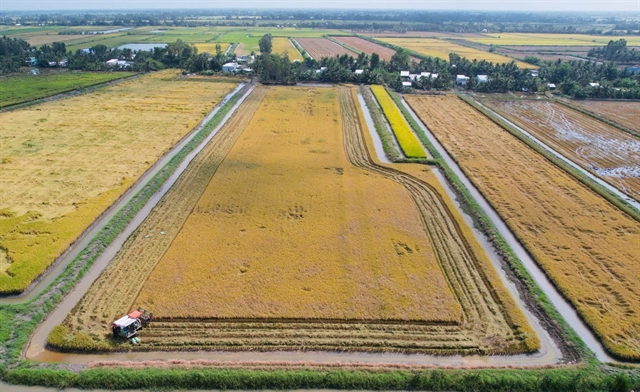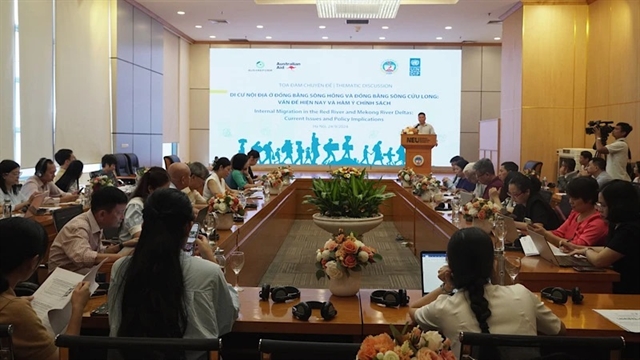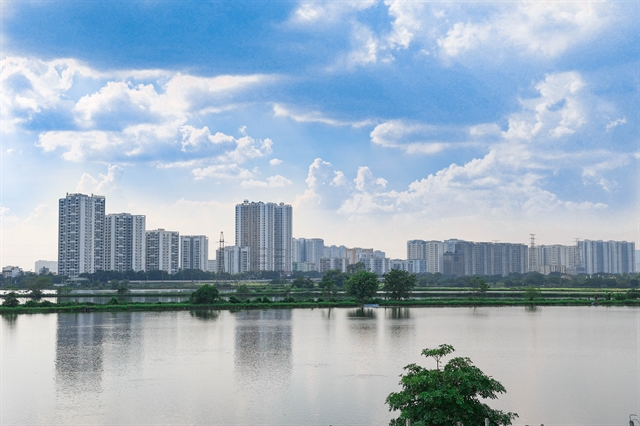 Society
Society
.jpg)

|
| The seminar on Tuesday. — Photo nhandan.vn |
HÀ NỘI — A study found that migrants in the Red River and the Mekong River Deltas struggle with poor living conditions, low income and a lack of family support.
That was said at Tuesday's seminar 'Internal Migration in the Red River and Mekong River Deltas: Current Issues and Policy Implications' co-organised by the Institute for Sustainable Development under the National Economics University and the United Nations Development Programme in Việt Nam (UNDP).
The study was conducted in nine provinces and cities, including four in the Red River Delta (Hà Nội, Bắc Ninh, Hải Dương and Nam Định), four in the Mekong River Delta (Cần Thơ, Long An, An Giang and Sóc Trăng), and Bình Dương in the southeast.
The study found that while migration management is closely followed in the Mekong River Delta, it is overburdened in the Red River Delta. Additionally, the coordination between residency management and labour management agencies is insufficient.
It revealed that although most migrants comply with temporary residence declaration and lodging notifications, they often fail to distinguish between the two procedures.
It also found that most migrants in the sample can not access basic social welfare benefits. On top of that, unskilled migrants are often employed in low-skilled jobs or as freelancers in seasonal employment, leaving them without health insurance, social insurance or any form of social security.
It also found that the majority of migrant workers reside in substandard housing, characterised by overcrowding, damp and a lack of basic amenities, especially fire safety measures. The disruption of their family lives and mental well-being has caused a range of social problems that require immediate attention.
It also found that migrant families often struggle to enroll their children in public schools due to overcrowding. As a result, many migrant children are forced to attend costly private preschools.
Additionally, it found that female migrants face a disproportionate burden of challenges, including psychological, social and community integration difficulties, compared to their male counterparts.
The study outlined a series of solutions and policy implications to ensure migrants' rights are safeguarded in their new communities. This includes government allocation of land for affordable housing, regardless of residency status, as well as the diversification of housing options to meet their specific needs.
In regions like the Mekong River Delta, promoting 'pendulum migration' by creating agricultural jobs and improving transportation infrastructure can help retain the workforce and reduce housing pressures.
Assistant Resident Representative at UNDP Sabina Stein, stressed that safeguarding migrants' rights is essential not only for justice but also for promoting sustainable development.
She underlined the need to foster the integration of migrants into local communities and build social cohesion to harness the full potential of migration.
She argued that providing equal access to education for migrant children in their new communities will significantly facilitate their integration. Streamlining administrative procedures for migrants in host provinces is also essential to support their settlement.
National Economics University's Vice President Nguyễn Thành Hiếu remarked that the study findings will contribute to enhancing the quality of life of migrants in the Red River and Mekong River Deltas by facilitating their access to public services and influencing policy development. — VNS
.jpg)



